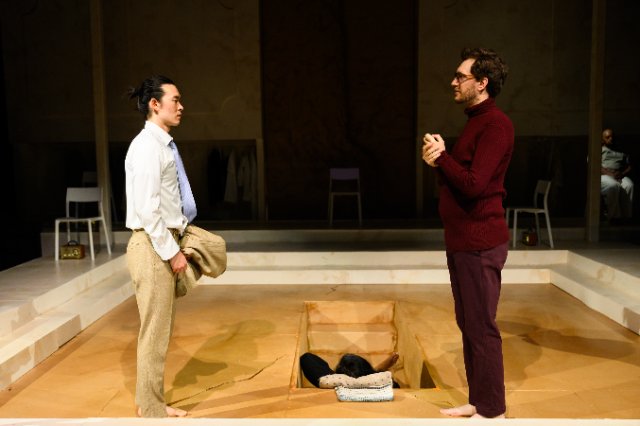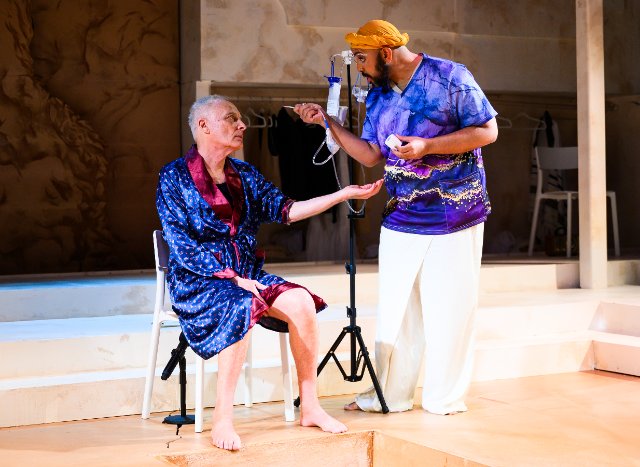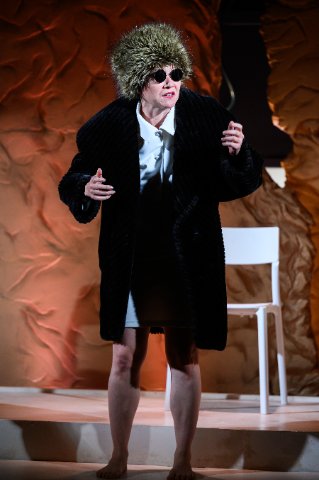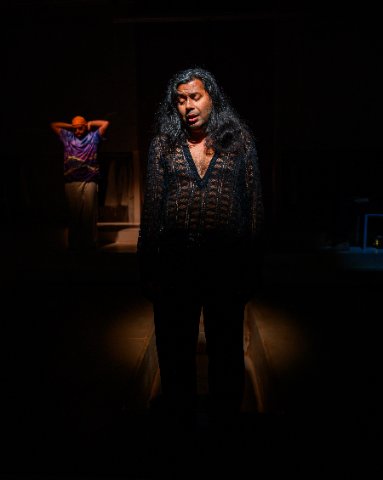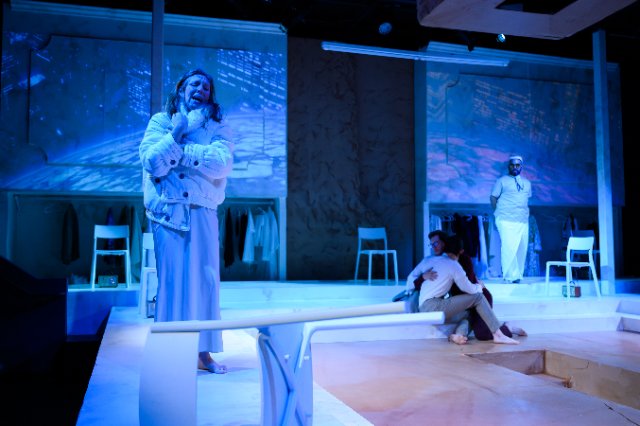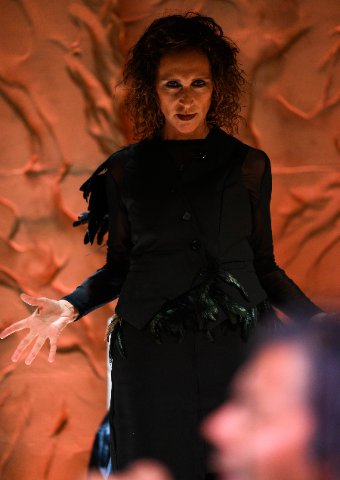Angels in America - Part 2 - Perestroika
The Closing Episodes of Epic Drama of 1980s
By: Victor Cordell - Oct 16, 2024
Tony Kushner followed Angels in America: Part 1 – Millennium Approaches, his matchless tale of homosexuality, AIDS, religion, and politics in the 1980s, with an equally compelling Angels in America: Part 2 – Perestroika. Though the two parts can be appreciated as independent plays, they represent a continuous narrative of the lives of a select few residing in New York City.
Rarely is a follow up of any sort as good as the original, but each part won the Tony Award for Best Play for their respective Broadway premiere years, 1993 and 1994, suggesting how exalted they are. With the same astounding cast and powerful staging orchestrated by Director Michael Socrates Moran in Millennium Approaches, Oakland Theater Project’s Perestroika is equally stellar in its breathtaking production.
Perestroika takes a little unraveling, with its interwoven stories, digressions, hallucinations, biblical allegories, and supernatural fantasies, yet the relevance of the title and the dominant thematic through-line in the narrative is established in the opening scene. In it, Alexii, the oldest living Bolshevik, rails against Mikhail Gorbachev for abandoning the theory-based communism of the Russian Revolution for an unknown and ill-defined future. Alexii asks, “What is the theory? Hamburgers?”
Erin Mei-Ling Stuart plays Alexii as well as a rabbi; the Mormon mother of Joe who outs himself to her; and Ethel Rosenberg, who Roy Cohn notoriously convicted for a death sentence for purportedly selling nuclear secrets to the USSR. Stuart persuades in every impersonation, both because of her fine acting and her facility with accents – Russian, New Yorker, Yiddish-American, and Utahan (?!).
In concert with the disruption to the Soviet’s established order by Gorbachev’s Perestroika, Kushner’s tale provides a transcendental account of how the divine stasis in heaven was disturbed by human movement and ceased altogether because of the San Francisco Earthquake of 1906! For heaven’s equilibrium to be restored, humankind must suspend social evolution. The message to stop movement is delivered to the AIDS-suffering Prior by the Angel, who Lisa Ramirez deftly depicts with looming, mystical charm. Her mere presence on stage provokes. Further, her gestures with undulating arms plus her words as with an orgasmic soliloquy make her even more intriguing.
But the playwright’s world view is opposite of the messages to halt human progress. Experimentation, migration, and intermarriage enrich societies. Stodgy, unimaginative religions and conservative political parties impede social progress and harmony. Change is the engine of meaningful life, and an important part of change is acceptance and integration of people from different tribes and orientations. Like democracy which is messy and flawed but the best political alternative, change beats stasis every time. Just look back a millennium and ask yourself if you’d want to live as they did.
If Kushner’s Perestroika has a weakness, it lies in the predictability of life’s transitions in the play. We know the characters. Some are doomed to die. Some relationships are bound to be severed. The strength however is in the intense journey and ultimate closure.
The most inflammatory character carried over from Part 1 continues to be the historical figure Roy Cohn, whose moral profile frightens with its similarity to his protégé, Donald Trump. When Cohn is hospitalized with terminal AIDS, his primary nurse Belize is a black, gay man who is played in flamboyant fashion by James Mercer II. Cohn’s unending racial and lifestyle insults (despite Cohn being a closeted gay) to the caretaker are so gratuitous that one wonders if his bile is driven more by his need to display bravado than by true disdain. But though Belize deplored Cohn, Mercer displays Belize’s dignity, compassion, and sensitivity. Belize even insists that a kaddish (Jewish sanctifying prayer) be said when Cohn dies.
As with Millennium Approaches, Victor Talmadge again nails the ever-bellicose Roy Cohn with an electrifying portrayal. Similarly, J Jha elicits empathy as the raspy, howling, lonely, but courageous Prior with great sensitivity; and Emilie Whelan penetrates the psyche of the crazed but recovering Harper. Rather than repeat my raves about these three actors as well as the stage elements, I’ll refer the reader to my review of Millennium Approaches on this site earlier this month.
Meanwhile the action intercuts with the continuing stories of Mormon law clerk Joe’s separation from his prescription-drug addled Harper; Joe’s mother Hannah coming to Brooklyn to live with Harper; and Louis’s abandoning Prior because Louis can’t cope with Prior’s AIDS.
With the dissolution of previous bonds, Joe and Louis establish a rebound relationship, and their differing affects present an interesting contrast. Joe is conflicted about his sexual identity and the attendant contradictions of being Mormon and Republican. In this role, Edric Young ably conveys the sadness and confusion of the conundrums, and his sensitive deer-in-the-headlights vacuous looks show how uneasy he is in his own skin.
Dean Linnard plays the committed gay Louis who is guilt-ridden about having left Prior. Excitable, he flails his hands in joy when pleased, which he is not when finding that Joe is not only an unrepentant Mormon but Republican, which does not align with values of the greater gay community. Louis’s ire is revealed when he verbally brutalizes Joe with chapter-and-verse reading aloud judicial opinions that Joe purportedly wrote for his boss, a circuit court judge. They are not only conservative, but disadvantage gays, reflecting the kinds of moral dilemmas closeted gays endure.
Angels in America constitutes a time capsule of a very important period of this country’s social and political history that reverberates with relevance even today. Seeing both parts, Millennium Approaches and Perestroika involves six hours of time exceptionally well spent. Great thanks to the playwright along with the creatives and especially the actors of these productions, who convincingly invest themselves in the massive and demanding roles, for a highly meaningful and greatly entertaining experience.
Angels in America: Part 2 – Perestroika, written by Tony Kushner is produced by Oakland Theater Company and plays at 514 4th Street, San Rafael, CA through October 27, 2024.

